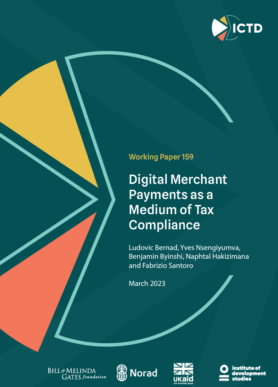Working Paper 159
Consumers in Africa increasingly pay for their purchases through mobile money, especially since the pandemic. These transactions are known as digital merchant payments. Rwandan consumers can choose between using standard mobile money services or a specific service only for digital merchant payments – MoMo Pay. Digital payments of any kind have the potential to improve tax compliance, because they imply digital data trails and better recordkeeping. How far is this potential being realised in Rwanda? In collaboration with the Rwanda Revenue Authority, we collected survey data from 1,100 merchants country-wide and were able to correlate this with tax administrative data, i.e. the tax records of the interviewees held by the revenue authority. We also conducted focus group discussions with 15 merchants. We found that the great majority of payments are still made in cash. Larger, more knowledgeable and financially included merchants opt for MoMo Pay as opposed to standard mobile money, the latter being preferred by female and less educated and equipped merchants. At the start of the pandemic, in March 2020, for a period of 18 months, all fees on MoMo Pay transactions were waived to foster digital payments through the service. In September 2021, fees were then reintroduced. The waiver led to a significant rise in the use of MoMo Pay relative to cash. When the MoMo Pay fee was reintroduced, there was a significant shift back to cash from both MoMo Pay and standard mobile money services, even if the latter were not affected by the fee. Lastly, we measure whether the adoption of digital payments correlates with merchants’ tax perceptions and compliance behaviour. First, we show that merchants using MoMo Pay tend to disagree with the obligation of paying taxes in order to receive public services, a measure of fiscal reciprocity. Such negative correlation is probably due to the fee imposed on MoMo Pay. Furthermore, standard mobile money usage improves the perceived ease of complying with taxes, while that is not the case for MoMo Pay. Again, the fact that fees on MoMo Pay are not clearly identifiable in MoMo Pay statements complicates merchants’ reporting and reconciliation of their activity for tax purposes. When it comes to compliance behaviour with VAT, the adoption of digital payments by merchants only improves their reported VAT sales and inputs, and only in the short term, while final VAT liability does not change. This hints at perverse compensating strategies to avoid taxes. We recommend that the tax administration better understand the adoption patterns of digital payments and incentivise usage among less equipped categories of taxpayers. The tax administration would also benefit from getting access to mobile money data to better monitor and enforce merchants’ compliance.
